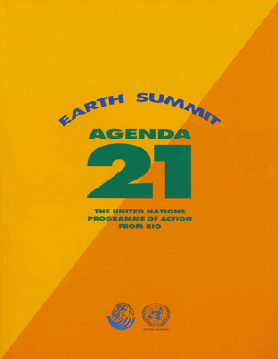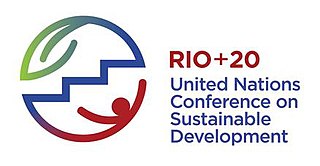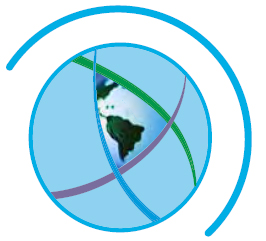Related Research Articles
The World Summit on Sustainable Development 2002, took place in South Africa, from 26 August to 4 September 2002. It was convened to discuss sustainable development organizations, 10 years after the first Earth Summit in Rio de Janeiro.

Agenda 21 is a non-binding action plan of the United Nations with regard to sustainable development. It is a product of the Earth Summit held in Rio de Janeiro, Brazil, in 1992. It is an action agenda for the UN, other multilateral organizations, and individual governments around the world that can be executed at local, national, and global levels. One major objective of the Agenda 21 initiative is that every local government should draw its own local Agenda 21. Its aim initially was to achieve global sustainable development by 2000, with the "21" in Agenda 21 referring to the original target of the 21st century.

The United Nations Conference on Environment and Development (UNCED), also known as the RioConference or the Earth Summit, was a major United Nations conference held in Rio de Janeiro from 3 to 14 June 1992.
The Rio Declaration on Environment and Development, often shortened to Rio Declaration, was a short document produced at the 1992 United Nations "Conference on Environment and Development" (UNCED), informally known as the Earth Summit. The Rio Declaration consisted of 27 principles intended to guide countries in future sustainable development. It was signed by over 175 countries.
The United Nations Commission on Sustainable Development (CSD) was a body under the UN Economic and Social Council (ECOSOC) tasked with overseeing the outcomes of the 1992 United Nations Conference on Environment and Development/Earth Summit. It was replaced in 2013 by the High-level Political Forum on Sustainable Development, which meets both under the General Assembly every four years and the ECOSOC in other years.

On 8 September 2000, following a three-day Millennium Summit of world leaders gathered in New York at the headquarters of the United Nations, the UN General Assembly adopted some 60 goals regarding peace; development; environment; human rights; the vulnerable, hungry, and poor; Africa; and the United Nations which is called Millennium Declaration . A follow-up outcome of the resolution was passed by the General Assembly on 14 December 2000 to guide its implementation. Progress on implementation of the Declaration was reviewed at the 2005 World Summit of leaders. The Declaration includes 8 chapters and 32 paragraphs.

The Decade of Education for Sustainable Development (DESD) 2005–2014 was an Education for Sustainable Development (ESD) initiative of the United Nations. The Decade was delivered by UNESCO as lead agency, and gave rise to Regional Centres of Expertise (RCE) networks, and the GUPES universities' partnership. The launch of the United Nations Decade of Education for Sustainable Development started a global movement to reorient education to address the challenges of sustainable development. It was the first UN Decade to establish a global monitoring and evaluation process and expert group. Building on the achievement of the Decade, stated in the Aichi-Nagoya Declaration on ESD, UNESCO endorsed the Global Action Programme on ESD (GAP) in the 37th session of its General Conference. Acknowledged by UN general assembly Resolution A/RES/69/211 and launched at the UNESCO World Conference on ESD in 2014, the GAP aims to scale-up actions and good practices. UNESCO has a major role, along with its partners, in bringing about key achievements to ensure the principles of ESD are promoted through formal, non-formal and informal education.
The United Nations Conference on the Human Environment was held in Stockholm, Sweden, during June 5–16, 1972.

Luis Alfonso de Alba Góngora is a Mexican diplomat.

Felix Dodds, born Michael Nicholas Dodds, is a British author, futurist, and activist.
The Stockholm Declaration of 1972, or the Declaration of the United Nations Conference on the Human Environment, is the first United Nations declaration on the global environment. It consists of 26 principles and led to the creation of the United Nations Environment Programme (UNEP), which laid the foundation for future global environmental governance. The United Nations Conference on the Human Environment was held in Stockholm, Sweden, from June 5–16 in 1972. The 1972 United Nations Conference on the Human Environment signifies the first international effort to place environmental issues at the forefront of global concerns. The Conference sought to recognize the finite nature of Earth's resources and human impacts on the environment. It represented the beginning of a global dialogue on the link between economic growth, the pollution of the environment, and the well-being of humanity. The resulting Stockholm Declaration urged its partnering nations to reduce air, land, and water degradation by integrating science and technology in their development plans. It also called nations to create regulations on wildlife protection, environmental conservation, and population control. While the reception of the ideas in the Declaration generally stayed positive, it received wide criticisms on its practical implementation, especially from developing nations.
The United Nations Programme of Action on the Sustainable Development of Small Island Developing States, popularly referred to as the Barbados Program of Action (BPOA), is a policy document that both: comprehensively addresses the economic, environmental, and social developmental vulnerabilities facing islands; and outlines a strategy that seeks to mitigate those vulnerabilities. It remains the only internationally approved programme specific to Small Island Developing States (SIDS) which has been collectively and unanimously endorsed by SIDS.

The United Nations Conference on Sustainable Development (UNCSD), also known as Rio 2012, Rio+20, or Earth Summit 2012 was the third international conference on sustainable development aimed at reconciling the economic and environmental goals of the global community. Hosted by Brazil in Rio de Janeiro from 13 to 22 June 2012, Rio+20 was a 20-year follow-up to the 1992 United Nations Conference on Environment and Development (UNCED) held in the same city, and the 10th anniversary of the 2002 World Summit on Sustainable Development (WSSD) in Johannesburg.

The Center for International Sustainable Development Law (CISDL) is an international legal research center that promotes sustainable societies and the protection of ecosystems.
The environmental sustainability problem has proven difficult to solve. The modern environmental movement has attempted to solve the problem in a large variety of ways. But little progress has been made, as shown by severe ecological footprint overshoot and lack of sufficient progress on the climate change problem. Something within the human system is preventing change to a sustainable mode of behavior. That system trait is systemic change resistance. Change resistance is also known as organizational resistance, barriers to change, or policy resistance.
Global Map is a set of digital maps that accurately cover the whole globe to express the status of global environment. It is developed through the cooperation of National Geospatial Information Authorities (NGIAs) in the world. An initiative to develop Global Map under international cooperation, the Global Mapping Project, was advocated in 1992 by Ministry of Construction, Japan (MOC) at the time.
United Nations System-wide Earthwatch is an initiative set up by the United Nations to bring together environmental observations by UN agencies within a consistent framework.
The environmental movement has made considerable progress from the first Greenpeace protest involving six people and a boat in 1971, to the environmental conferences of today involving the world’s leaders and commanding global attention. Environmental mega conferences differ from small environmental and sustainability conferences in fundamental ways. Rather than focusing on specific regional problems such as acid rain or ‘sectoral’ problems such as human health or food, they try to take a synoptic overview of the relationship between human society and the natural world. They aim to; “firstly address the overall trajectory of human development and its relationship with the environment as a whole and secondly take a broader view of the complex environment and development issues over a longer time frame, as each summit is preceded by a number of pre-conferences”.

The United Nations High-level Political Forum on Sustainable Development (HLPF) is a subsidiary body of both the United Nations General Assembly and the United Nations Economic and Social Council responsible for the entire organization's policy on sustainable development. It adopts negotiated declarations, reviews commitment and the progress of the 2030 Agenda for Sustainable Development. The Forum replaced the Commission on Sustainable Development on the 24 September 2013 Meetings of the Forum are open to all Member States of the United Nations.
The Earth Summits are decennial meetings of world leaders, organized since 1972 with help of the United Nations, to help defining ways to stimulate sustainable development at the global level. The aim is to bring together the best individuals and organisations humanity can bring forward from all kind of categories of life, to identify and update what are humanity's most pressing challenges, to quantify them, identify solutions and develop a plan of action not to run into a wall. This plan of action is called Agenda 21 and implemented by many local governments under the name Local Agenda 21. The plan of action is designed as a TQM - Total Quality Manual, designed smartly and open enough, so that also organisations, companies and individuals can use it as a basis for their own plan of action and guidance not to miss out on important issue; it helps speed up understanding and identifying partners by e.g. using similar wordings and symbols. The 2000-2015 Millennium Development Goals and the 2015-2030 Global Goals are results from these Earth Summits. The first summit took place in Rio de Janeiro (Brazil) in 1992. Last Earth Summit, called Rio+20, also took place in Rio de Janeiro in 2012.
References
- 1 2 Johannesburg Declaration on Sustainable Development, A/CONF.199/20, Chapter 1, Resolution 1, Johannesburg, September 2002
- ↑ Plan of Implementation of the World Summit on Sustainable Development, A/CONF.199/20, Chapter 1, Resolution 2, Johannesburg, September 2002
- ↑ Declaration of the United Nations Conference on the Human Environment, A/CONF.48/14/Rev.1, Chapter I, Stockholm, June 1972
- ↑ Rio Declaration on Environment and Development, A/CONF.151/26 (Vol. I), Chapter I, Annex I, Rio de Janeiro, June 1992